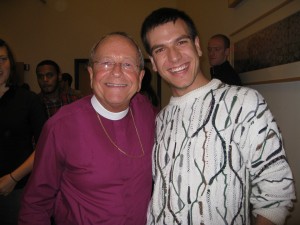On Wednesday, I crossed the river over to MIT to hear Bishop Gene Robinson of the Episcopal Church preside, preach, and give a mini talk back over dinner. As someone who works in LGBTQ ministry, I was ecstatic that I was going to be receiving the Eucharist from the person who really put Queer People of Faith (QPF’s, as I like to refer to us) on the map. He had spoken a few weeks ago to a crowd at the Harvard Bookstore discussing his new book, God Believes in Love: Straight Talk about Gay Marriage, but unfortunately I was too busy watching a four hour, fifteen minute avant garde opera in Brooklyn (I promised in an earlier blog post that I would reflect on that experience here at one point, and I promise, I will! Soon!). The event was sponsored by the Lutheran Episcopal Chaplaincy at MIT; mass was said in the MIT Chapel and dinner served in an adjacent building.
I absolutely MUST go off on a little tangent about the MIT Chapel. I am a huge architecture buff, so visiting MIT’s campus is an absolute delight. The chapel was built in 1955 by a Finnish-American architect I am quite fond of, Eero Saarinen. When I first came upon the building, I admit I thought it was some sort of smokestack or vent for some underground lab, but when I stepped inside, I was surprised at how warm it felt. Once I got out of the vestibule and into the main part of the chapel, I was instantly hit by how much I thought I was in an underground chamber, which I think was a brilliant design choice by Saarinen. It evoked in me a feeling of what it might have been like to be at mass during the early history of the church, literally and figuratively underground. Appropriate, I think, for a conversation about queer spirituality.
Back to the actual event, Bishop Robinson spoke extensively in his homily about how we are all called to be prophets in our own way. As I like to think of it, making the comfortable uncomfortable and the uncomfortable comfortable. Something that he said really resounded with me: the idea that to be a prophet, we have to have a vision for what we want the world to be. I feel that it is easy, when in an activist’s position, to advocate for Change Change Change! when there is little thought put to actually how we want the world to change. I certainly admit to falling prey to this; it is easier to see the way that things aren’t going correctly than to actually find a solution. I think that it is telling that the best prophets are the ones that actually enact social change because they have a clear vision of what the Kingdom of God can look like on earth. Howard Thurman had a vision that we all could find Common Ground, and with this philosophy he nourished a university that challenges its students to find what makes them come alive and to go do it (because what this world needs is people who come alive!).
My work with QPF’s implies one part of my vision for the world: I envision a Church that fully includes and affirms all of its members, not just despite of their differences, but explicitly because of them. It is our differences that make up our identities, and I absolutely believe that we find Common Ground when we discover all that makes us so unique and interesting.
PS: I also blogged about Bishop Robinson and prophetic visions for my Dramaturgy class. I am trying to have a few topics that I blog about both for my CFA class and for this Marsh Chapel blog. Check it out here!
